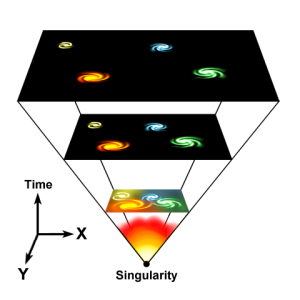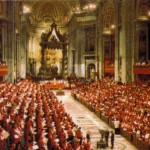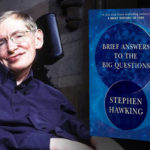Why We Should Be Cautious Using the Big Bang Argument
by Jimmy Akin
Filed under Atheism, Cosmology, God, Science, The Existence of God
Since it was proposed by Fr. Georges Lemaître, the Big Bang has been common in discussions of the existence of God.
The reasons are obvious. The Big Bang looks like a plausible beginning for the physical universe. Things that begin need causes. The beginning of the physical universe would need a cause, which would seem to lie outside the physical universe. This coheres well with the Christian claim that God is a non-physical being who created the physical universe.
The argument has been elaborated various ways, but that's the basic idea.
One of its fans was Pope Pius XII, who elaborated a version of it in a speech about this to the Pontifical Academy of the Sciences back in 1951.
It's basically a version of the Kalaam cosmological argument that uses evidence from modern cosmology to support the premise that the universe had a beginning.
It even resonates with the "Let there be light" moment in Genesis.
I think that there is a proper role for the Big Bang in discussions of God's existence, but it has to be used with some caution.
Here's why . . .
"Let There Be Light"?
One temptation is to identify the Big Bang not just as the moment of creation but specifically as the creation of light in Genesis 1. That’s problematic because Genesis does not portray the creation of light as the moment the world came into existence. Let’s look at the text:
1 In the beginning God created the heavens and the earth.
2 The earth was formless and void, and darkness was over the surface of the deep, and the Spirit of God was moving over the surface of the waters.
3 Then God said, “Let there be light”; and there was light.
In the text, the earth already exists in a formless and empty state, with a deep of waters that has a surface, which the Spirit of God hovers over. Then light gets created.
So Genesis depicts the creation of light happening when the heavens and the earth and its waters already exist. At least that is how the text depicts it. You can argue that this isn’t to be taken literally, but that only makes the same point another way: We shouldn’t be too quick to identify the Big Bang with the creation of light in Genesis. We have to be careful about mapping Genesis onto modern cosmology.
In fact, Pope John Paul II warned specifically against trying to draw scientific conclusions from the creation account in Genesis 1:
Above all, this text has a religious and theological importance. It doesn't contain significant elements from the point of view of the natural sciences. Research on the origin and development of the individual species in nature does not find in this description any definitive norm or positive contributions of substantial interest [General Audience, Jan. 29, 1986].
The Moment of Creation?
There is another thing we need to be careful about, which is identifying the Big Bang as the moment of the physical universe came into existence.
It may well have been. I would love for us to find a way to prove that scientifically.
But we’re not there at present. Scientifically, there is still a lot about the Big Bang that is a mystery. We just don’t understand it. The evidence shows that it happened, but not why it happened. We have very little clue about that scientifically—and there may well be no scientific answer. It may be that God just did it, and did it in a way not susceptible to scientific study.
But that’s not the only option. There are others that cannot presently be ruled out on scientific grounds. For example, the visible universe we see today may have budded off of a larger universe that we cannot see, and the moment it budded off may have been the Big Bang. There are other options, too.
Implications
If we one day get solid evidence of something physical existing before the Big Bang, what would the implications be?
From the viewpoint of the Christian faith, if there was a physical universe before the Big Bang then it would mean that God created the universe—from nothing—even farther back in time than we can currently see.
From the viewpoint of discussions of God's existence, it would mean that one of the premises in the Kalaam cosmological argument would lose its scientific support--unless, of course, new science pointed to a beginning even further back. (And there are those who have argued on scientific grounds that the universe cannot extend back infinitely far in time.)
Losing scientific support from the Big Bang would not disprove the existence of God. It wouldn't even disprove the Kalaam cosmological argument. It would just mean that the premise in question would have to be supported some other way.
If it were to turn out that the Big Bang was not the beginning of the physical universe then this argument in apologetics would have to be revised.
That's nothing to be ashamed of, though. Apologetics, like the physical sciences, is subject to revision based on the evidence available at the time.
New Science?
Some scientists, such as the iconoclastic Roger Penrose, have already claimed to have found evidence of a pre-Big Bang universe, though his claims are disputed by other scientists.
Plans are afoot, though, for a new set of scientific projects that may let us discern something about the state of the universe before the Big Bang (if there was one). More info here.
It will be interesting to see what the results of these are.
For now, though, the Big Bang still looks like the beginning of the physical universe, and it has a legitimate place in discussions of God's existence.
It just should not be presented as if we had absolute proof of creation in time, because we don't.
That's something that Pius XII pointed out in his 1951 speech.
While hailing the discovery of the Big Bang, he also cautioned that “the facts established up to the present time are not an absolute proof of creation in time, as are the proofs drawn from metaphysics and revelation.”
So, while the idea of the Big Bang is consistent with the idea that the universe was created a finite time ago, and while the Big Bang may be that moment of creation, we should not present this as if it were definitively established.
What Now?
If you like the information I've presented here, you should join my Secret Information Club.
If you're not familiar with it, the Secret Information Club is a free service that I operate by email.
I send out information on a variety of fascinating topics connected with the Catholic faith.
In fact, the very first thing you’ll get if you sign up is information about what Pope Benedict said about the book of Revelation.
He has a lot of interesting things to say!
If you’d like to find out what they are, just sign up at www.SecretInfoClub.com or use this handy sign-up form:
Just email me at jimmy@secretinfoclub.com if you have any difficulty.
In the meantime, what do you think?
Related Posts
Note: Our goal is to cultivate serious and respectful dialogue. While it's OK to disagree—even encouraged!—any snarky, offensive, or off-topic comments will be deleted. Before commenting please read the Commenting Rules and Tips. If you're having trouble commenting, read the Commenting Instructions.













